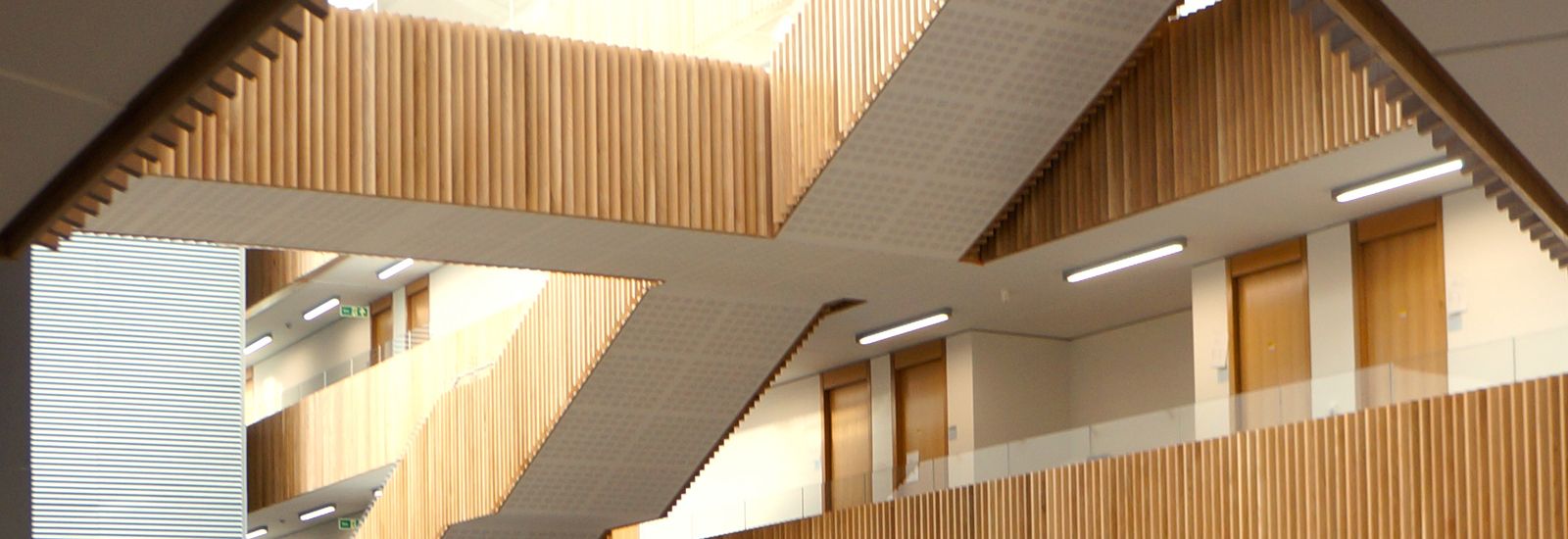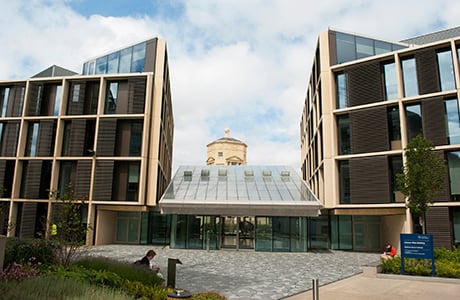
Mathematics
Course overview
UCAS code: G100
Entrance requirements: A*A*A with the A*s in Maths and Further Maths if available.
Course duration: 3 years (BA); 4 years (MMath)
Subject requirements
Required subjects: Maths
Recommended subjects: Further Maths
Helpful subjects: Not applicable
Other course requirements
Admissions tests: MAT
Written Work: None
Admissions statistics*
Combined statistics for Mathematics and Mathematics and Statistics:
Interviewed: 31%
Successful: 9%
Intake: 182
*3-year average 2022-24
Contact
Email: undergraduate.admissions@maths.ox.ac.uk
Unistats information for this course can be found at the bottom of the page
Please note that there may be no data available if the number of course participants is very small.
About the course
Mathematicians have always been fascinated by numbers. One of the most famous problems is Fermat’s Last Theorem:
if n≥3, the equation xn+yn=zn has no solutions with x, y, z all nonzero integers.
An older problem is to show that one cannot construct a line of length 3√2 with ruler and compass, starting with a unit length.
Often the solution to a problem will require you to think outside its original framing. This is true here, and while you will see the second problem solved in your course, the first is far too deep and was famously solved by Andrew Wiles.
In applied mathematics we use mathematics to explain phenomena that occur in the real world. You can learn how a leopard gets its spots, explore quantum theory and relativity, or study the mathematics of stock markets.
We will encourage you to ask questions and find solutions for yourself. We will begin by teaching you careful definitions so that you can construct theorems and proofs.
Above all, mathematics is a logical subject, and you will need to think mathematically, arguing clearly and concisely as you solve problems. For some of you, this way of thinking or solving problems will be your goal. Others will want to see what else can be discovered. Either way, it is a subject to be enjoyed.
There are two Mathematics degrees, the three-year BA and the four-year MMath. Decisions regarding continuation to the fourth year do not have to be made until the third year.
The first year consists of core courses in pure and applied mathematics (including statistics).
Options start in the second year, with the third and fourth years offering a large variety of courses, including options from outside mathematics.
 |  | |
'The Mathematics course is absolutely fantastic and is essentially problem-solving on a daily basis, which I love. You attend lectures to learn the material and then complete problem sheets on the topics. Certainly, for me, the most rewarding aspect of mathematics is solving problems, especially when they have been initially unyielding, or seemingly unapproachable; and this is right at the core of the course. I chose to read mathematics at university because I have a real passion for the subject, and wanted to gain a deeper understanding of some of the beauty it holds. I’ve found the course has really pushed the boundaries of what I thought I could achieve, which is extremely rewarding.' Chris | 'Studying Mathematics at Oxford has been a massive change from A-Level but I have been really enjoying it, I especially love having tutorials as they are a fantastic opportunity to work through problems that specifically you and your tutorial partner are having difficulties with and ask questions that allow you to improve yourself as a mathematician.' Beth |
Unistats information
Discover Uni course data provides applicants with Unistats statistics about undergraduate life at Oxford for a particular undergraduate course.
Please select 'see course data' to view the full Unistats data for Mathematics.
Please note that there may be no data available if the number of course participants is very small.
Visit the Studying at Oxford section of this page for a more general insight into what studying here is likely to be like.
Mathematics
A typical week (Years 1 and 2)
- Around ten lectures and two-three tutorials or classes a week
A typical week (Years 3 and 4)
- Six-ten lectures and two-four classes each week, depending on options taken
- Compulsory dissertation in the fourth year
Tutorials are usually 2-4 students and a tutor. Class sizes may vary depending on the options you choose. There would usually be around 8-12 students though classes for some of the more popular papers may be larger.
Most tutorials, classes, and lectures are delivered by staff who are tutors in their subject. Many are world-leading experts with years of experience in teaching and research. Some teaching may also be delivered by postgraduate students who are usually studying at doctoral level.
To find out more about how our teaching year is structured, visit our Academic Year page.
Course structure
There are two Mathematics degrees, the three-year BA and the four-year MMath. Decisions regarding continuation to the fourth year do not have to be made until the third year.
Admission to Mathematics is joint with Mathematics & Statistics, and applicants do not choose between the two degrees until the end of their fourth term at Oxford. At that point, all students declare whether they wish to study Mathematics or study Mathematics & Statistics. Further changes later on may be possible subject to the availability of space on the course and the consent of the college.
The first year consists of core courses in pure and applied mathematics (including statistics). Options start in the second year, with the third and fourth years offering a large variety of courses, including options from outside mathematics.
Year 1
Courses | Assessment |
|---|---|
Compulsory Year 1 includes:
| First University examinations: five compulsory papers; Computational mathematics projects |
Year 2
Courses | Assessment |
|---|---|
| Final University examinations, Part A: three core papers and six or seven optional papers |
Years 3 and 4
Courses | Assessment |
|---|---|
The options listed above are illustrative and may change. A full list of current options is available on the Mathematics website. | Year 3: Final University examinations, Part B: eight papers or equivalent Year 4: Final University examinations, Part C: eight, nine or ten papers or equivalent, including a dissertation. |
MMathPhys Year 4
The Physics and Mathematics Departments jointly offer an integrated master’s level course in Mathematical and Theoretical Physics.
Mathematics students are able to apply for transfer to a fourth year studying entirely mathematical and theoretical physics, completing their degree with an MMathPhys.
The course offers research-level training in: Particle physics, Condensed matter physics, Astrophysics, Plasma physics and Continuous media.
The content and format of this course may change in some circumstances. Read further information about potential course changes.
Academic requirements
Qualification | Requirements |
|---|---|
A-levels: | A*A*A with the A*s in Mathematics and Further Mathematics (if available). For those whom Further Mathematics is not available: either A*AAa with A* in Mathematics and a in AS-level Further Mathematics or A*AA with A* in Mathematics. |
Advanced Highers: | AA/AAB |
International Baccalaureate (IB): | 39 (including core points) with 766 at HL (the 7 must be in Higher Level Mathematics) |
Any other equivalent qualification: | View information on other UK qualifications, and international qualifications. |
Wherever possible, your grades are considered in the context in which they have been achieved.
Read further information on how we use contextual data.
Subject requirements
Essential: | Candidates are expected to have Mathematics to A-level (A* grade), Advanced Higher (A grade), Higher Level in the IB (score 7) or another equivalent. |
|---|---|
Recommended: | Further Mathematics is highly recommended. |
The majority of those who read Mathematics will have taken both Mathematics and Further Mathematics at A-level (or the equivalent).
If a practical component forms part of any of your science A‐levels used to meet your offer, we expect you to pass it.
If English is not your first language you may also need to meet our English language requirements.
Applying
All candidates must follow the application procedure as shown on our Applying to Oxford pages.
The following information gives specific details for students applying for this course.
Admissions test
Test: | MAT |
|---|---|
Test dates: | 22 & 23 October 2025 |
Registration window: | To be confirmed |
All candidates must take the Mathematics Admissions Test (MAT) as part of their application.
All the information you need to arrange to take your test as well as how best to prepare can be found on your test page.
Written work
You do not need to submit any written work when you apply for this course.
What are tutors looking for?
Tutors are looking for a candidate’s potential to succeed on the course. We recommend that candidates challenge themselves with Mathematics beyond their curriculum, question their own understanding, and take advantage of any available extension material.
Ultimately, we are most interested in a candidate’s potential to think imaginatively, deeply and in a structured manner about the patterns of mathematics.
Visit the Maths Department website for more detail on the selection criteria for this course.
Careers
Quantitative skills are highly valued, and this degree prepares students for employment in a wide variety of occupations in the public and private sectors.
Around 30% of our graduates go on to further study, but for those who go into a profession, typical careers include finance, consultancy and IT.
Nathan, an engineer, says:
‘During my degree I developed my ability to solve complex problems – a fundamental skill set to tackle challenges I encounter on a day-to-day basis as an engineer. The application of mathematics in engineering and manufacturing is ever increasing, meaning there will be more and more opportunities to find interesting roles in which I can apply my skills.’
Note: These annual fees are for full-time students who begin this undergraduate course here in 2025. Course fee information for courses starting in 2026 will be updated in September.
We don't want anyone who has the academic ability to get a place to study here to be held back by their financial circumstances. To meet that aim, Oxford offers one of the most generous financial support packages available for UK students and this may be supplemented by support from your college.
Fees
For more information please refer to our course fees page. Fees will usually increase annually. For details, please see our guidance on likely increases to fees and charges.
Living costs
Living costs at Oxford might be less than you’d expect, as our world-class resources and college provision can help keep costs down.
Living costs for the academic year starting in 2025 are estimated to be between £1,425 and £2,035 for each month you are in Oxford. Our academic year is made up of three eight-week terms, so you would not usually need to be in Oxford for much more than six months of the year but may wish to budget over a nine-month period to ensure you also have sufficient funds during the holidays to meet essential costs. For further details please visit our living costs webpage.
Financial support
Home | A tuition fee loan is available from the UK government to cover course fees in full for Home (UK, Irish nationals and other eligible students with UK citizens' rights - see below*) students undertaking their first undergraduate degree**, so you don’t need to pay your course fees up front. In 2025 Oxford is offering one of the most generous bursary packages of any UK university to Home students with a family income of around £50,000 or less, with additional opportunities available to UK students from households with incomes of £32,500 or less. The UK government also provides living costs support to Home students from the UK and those with settled status who meet the residence requirements. *For courses starting on or after 1 August 2021, the UK government has confirmed that EU, other EEA, and Swiss Nationals will be eligible for student finance from the UK government if they have UK citizens’ rights (i.e. if they have pre-settled or settled status, or if they are an Irish citizen covered by the Common Travel Area arrangement). The support you can access from the government will depend on your residency status. |
Islands | Islands students are entitled to different support to that of students from the rest of the UK. Please refer the links below for information on the support to you available from your funding agency: |
Overseas | Please refer to the "Other Scholarships" section of our Oxford Bursaries and Scholarships page. |
**If you have studied at undergraduate level before and completed your course, you will be classed as an Equivalent or Lower Qualification student (ELQ) and won’t be eligible to receive government or Oxford funding
Additional Fees and Charges Information for Mathematics
There are no compulsory costs for this course beyond the fees shown above and your living costs.
Contextual information
Unistats course data from Discover Uni provides applicants with statistics about a particular undergraduate course at Oxford. For a more holistic insight into what studying here is likely to be like, please view the information below and explore our website more widely.
The Oxford tutorial
College tutorials are central to teaching at Oxford. Typically, they take place in your college and are led by your academic tutor(s) who teach as well as do their own research. Students will also receive teaching in a variety of other ways, depending on the course. This will include lectures and classes, and may include laboratory work and fieldwork. However, tutorials offer a level of personalised attention from academic experts unavailable at most universities.
During tutorials (normally lasting an hour), college subject tutors will give you and one or two tutorial partners feedback on prepared work and cover a topic in depth. The other student(s) in your tutorials will typically be doing the same course as you and covering the same topic. Such regular and rigorous academic discussion develops and facilitates learning in a way that isn’t possible through lectures alone. Tutorials also allow for close progress monitoring so tutors can quickly provide additional support if necessary.
Read more about tutorials and an Oxford education
College life
Our colleges are at the heart of Oxford’s reputation as one of the best universities in the world.
- At Oxford, everyone is a member of a college as well as their subject department(s) and the University. Students therefore have both the benefits of belonging to a large, renowned institution and to a small and friendly academic community. Each college or hall is made up of academic and support staff, and students. Colleges provide a safe, supportive environment leaving you free to focus on your studies, enjoy time with friends and make the most of the huge variety of opportunities.
- Each college has a unique character, but generally their facilities are similar. Each one, large or small, will have the following essential facilities:
- Porters’ lodge (a staffed entrance and reception)
- Dining hall
- Lending library (often open 24/7 in term time)
- Student accommodation
- Tutors’ teaching rooms
- Chapel and/or music rooms
- Laundry
- Green spaces
- Common room (known as the JCR).
- All first-year students are offered college accommodation either on the main site of their college or in a nearby college annexe. This means that your neighbours will also be ‘freshers’ and new to life at Oxford. This accommodation is guaranteed, so you don’t need to worry about finding somewhere to live after accepting a place here, all of this is organised for you before you arrive.
- All colleges offer at least one further year of accommodation and some offer it for the entire duration of your degree. You may choose to take up the option to live in your college for the whole of your time at Oxford, or you might decide to arrange your own accommodation after your first year – perhaps because you want to live with friends from other colleges.
- While college academic tutors primarily support your academic development, you can also ask their advice on other things. Lots of other college staff including welfare officers help students settle in and are available to offer guidance on practical or health matters. Current students also actively support students in earlier years, sometimes as part of a college ‘family’ or as peer supporters trained by the University’s Counselling Service.
FIND OUT MORE

Our 2025 undergraduate Open Days will be held on 2 and 3 July and 19 September.
Register to find out more about our upcoming Open Days.
Mathematics Open Days - 26 April and 3 May 2025.
Mathematical Sciences Research
Mathematical Sciences at The University of Oxford was listed as one of the best in the UK in the most recent (2021) Research Excellence Framework (REF).
RELATED PAGES
FEEL INSPIRED?
Why not have a look at the reading lists for prospective Mathematics applicants on the department's website?
You can also watch recent lectures, and see a real first-year tutorial on the Mathematics YouTube channel to get a feel for what studying here is like and find out about the department's research at the Oxford Mathematics Alphabet.
